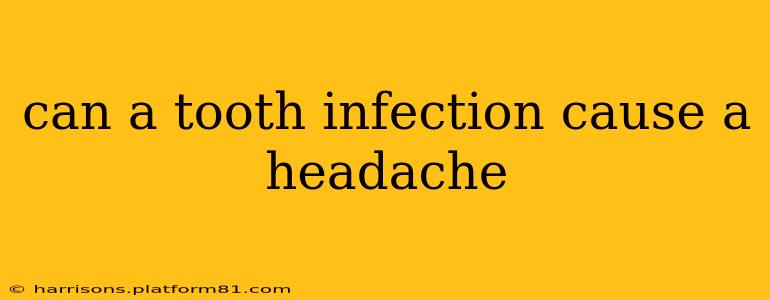Yes, a tooth infection can absolutely cause a headache. The pain isn't just confined to your mouth; it can radiate and manifest as a headache, often quite severe. This connection is due to the intricate network of nerves and tissues in your head and face. Let's explore this connection in more detail.
How Does a Tooth Infection Lead to a Headache?
A tooth infection, also known as an abscess, occurs when the pulp (the soft tissue inside your tooth containing nerves and blood vessels) becomes infected, usually by bacteria. This infection can cause significant inflammation and pressure buildup within the tooth. The trigeminal nerve, a major cranial nerve responsible for sensation in the face, including teeth, is directly implicated. When the infection inflames this nerve, the pain signals travel along the nerve pathways, often leading to pain felt not just in the affected tooth but also in the head and surrounding areas.
What Kind of Headache Does a Tooth Infection Cause?
The headache associated with a tooth infection isn't typically a classic migraine or tension headache. Instead, it often presents as:
- A throbbing pain: This pain often intensifies with chewing or biting.
- Localized pain: The pain is usually felt on one side of the head, corresponding to the infected tooth.
- Referred pain: The pain may radiate to the jaw, ear, or temple, making it difficult to pinpoint the exact source.
- Accompanied by other symptoms: In addition to headache, you might experience facial swelling, fever, sensitivity to hot and cold temperatures, and a bad taste in your mouth.
What Other Symptoms Might Accompany a Tooth Infection Headache?
Facial Swelling: Inflammation from the infection can cause noticeable swelling in the cheek or jaw area.
Fever: A fever is a common sign of infection in the body.
Sensitivity to Hot and Cold: The infected tooth will likely be extremely sensitive to changes in temperature.
Bad Taste in the Mouth: Pus from the infection can cause a foul or metallic taste in the mouth.
How Can I Tell if My Headache is Caused by a Tooth Infection?
It's crucial to see a dentist if you suspect a tooth infection. They can perform a thorough examination, take x-rays (if necessary), and accurately diagnose the problem. Self-treating a tooth infection can lead to serious complications. Key indicators suggesting your headache stems from a tooth infection include:
- Localized pain near a specific tooth: The pain is not diffuse but concentrated around a particular tooth.
- Pain exacerbated by chewing or biting: The pain worsens when you put pressure on your teeth.
- Other oral symptoms: Experiencing swelling, sensitivity, or a bad taste in your mouth alongside the headache.
When Should I See a Dentist?
Don't delay seeking professional help if you experience a headache coupled with any signs of a tooth infection. Early diagnosis and treatment can prevent the infection from spreading, potentially leading to more serious health issues like a spreading infection (cellulitis), or even a serious blood infection (bacteremia).
Can Over-the-Counter Pain Relievers Help?
Over-the-counter pain relievers like ibuprofen or acetaminophen can temporarily alleviate the pain, but they will not address the underlying infection. They should be considered only as a temporary measure while you seek professional dental care.
Can a Tooth Infection Cause Other Types of Headaches?
While the typical headache associated with a tooth infection presents as described above, it's important to remember that severe or prolonged infections can sometimes contribute to more widespread headaches or even trigger other types of headaches in susceptible individuals.
In conclusion, a tooth infection can indeed cause headaches, often characterized by localized, throbbing pain that may radiate to other areas of the head and face. If you suspect a tooth infection is the cause of your headache, seek immediate dental attention. Prompt treatment is vital to prevent further complications.
